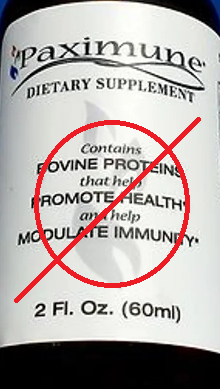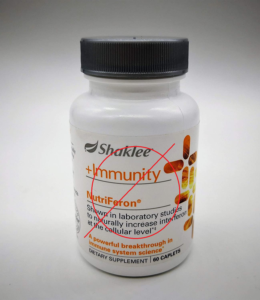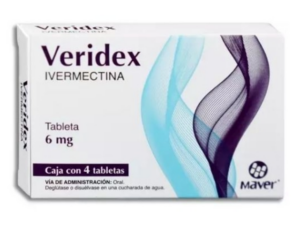Here is the link for more information on other Dangerous Items.
And here is where to find information about other recommended supplements.
All discussions above or around Peat’s quotes are based on my own opinions and interpretations and what I have found useful for my own use as well as from feedback from many, many, many, many others.
Interferon Alpha:
When I asked Peat in an email about the use and safety of interferon alpha (and ivermectin, but see the DANGERS for ivermectin too) for help for those in pain with autoimmune symptoms after being Covid vaccine injured or injured from Long Haul Covid infections, specifically the interferon alpha Paximune product, he wrote me the following:
“If anything, I’m more emphatic now about the dangers of interferon—it’s fairly central to autoimmunity and the cytokine storm. Ivermectin’s protective effects are probably mostly as an anti-inflammatory. It’s a 16-member lactone macrocyclic ring; the anti-inflammatory macrolides, azithromycin and erytromycin, are 14-member rings, probably with overlapping functions.
Taken orally, and in a very small dose, alpha interferon isn’t likely to be harmful, but I think it’s still a risk.
Progesterone, thyroid, vitamin D, calcium [from Eileen: raw milk] and aspirin are helpful/curative for autoimmune problems, including lupus; unopposed estrogen is the basic factor in autoimmune diseases.” -Ray Peat
=========================================
References from Peat included in the email:
Front. Immunol., 18 October 2021.
Interferon Genes Are Influenced by 17β-Estradiol in SLE.
Ram P. Singh1,2*†, Bevra H. Hahn2 and David S. Bischoff1,3
1Research Service, Veteran Administration Greater Los Angeles Healthcare System, Los Angeles, CA, United States
2Division of Rheumatology, Department of Medicine, University of California, Los Angeles, Los Angeles, CA.
3Department of Medicine, University of California, Los Angeles, Los Angeles, CA.
Recent evidence suggests the existence of a nexus between inflammatory pathways and the female sex hormone 17β-estradiol, resulting in increased interferon-stimulated genes (ISGs), autoantibodies, and dysregulation of immune cells in SLE. However, the molecular mechanisms and the effect of estradiol on candidate target genes and their pathways remains poorly understood. Our previous work suggests that female SLE patients have increased estradiol levels compared to healthy controls. In the present study, we explored the effects of 17β-estradiol treatment on expression of IFN (interferons)-stimulated genes and pro-inflammatory cytokines/chemokines. We found significantly increased (5-10-fold) expression of IFN-regulated genes in healthy females. Furthermore, we found significantly increased plasma levels of IL-6, IL-12, IL-17, IL-18, stem cell factor (SCF), and IL-21/IL-23 in SLE patients compared to healthy controls, and those levels positively correlated with the plasma levels of 17β-estradiol. In addition, levels of IL-21 positively correlated with the SLE disease activity index (SLEDAI) score of SLE patients. In vitro treatment of PBMCs from either SLE patients or healthy controls with 17β-estradiol at physiological concentration (~50 pg/ml) also significantly increased secretion of many pro-inflammatory cytokines and chemokines (IL-6, IL-12, IL-17, IL-8, IFN-γ; MIP1α, and MIP1β) in both groups. Further our data revealed that 17β-estradiol significantly increased the percentage of CD3+CD69+ and CD3+IFNγ+ T cells; whereas, simultaneous addition of 17β-estradiol and an ERα inhibitor prevented this effect. Collectively, our findings indicate that 17β-estradiol participates in the induction of pro-inflammatory cytokines and chemokines and further influences interferon genes and pathways.
Investigative Ophthalmology & Visual Science September 2006, Vol.47, 3946-3950. doi:https://doi.org/10.1167/iovs.06-Interferon-α: A Key Factor in Autoimmune Disease?
Jarka Plskova; Kathrin Greiner; Elizabeth Muckersie; Linda Duncan; John V. Forrester
Abstract
purpose. Interferon (IFN)-α is an effective drug for treatment of uveitis in Behçet’s disease. This study was undertaken to investigate the mechanism of action of IFN-α in the treatment of various types of noninfectious sight-threatening uveitis.
methods. Eleven patients with refractory uveitis, and 13 healthy individuals were enrolled. The number of circulating plasmacytoid dendritic cells (pDCs) and their capacity to produce IFN-α in culture on stimulation with synthetic oligodinucleotides containing the CpG-motif were studied. Peripheral blood CD4+ T-cell phenotype and activation status were evaluated by flow cytometry at 0, 2, and 8 weeks after treatment for expression of CD69, CD62L, chemokine receptors (CCR4, CXCR3, and CCR5), and intracellular cytokines (TNF-α, IFN-γ, and IL-10).
results. All patients experienced a positive clinical response to IFN-α treatment. There was no significant difference between patients and control subjects in the number of circulating pDCs, but there was a significant decrease in the capability of patients’ pDCs to produce IFN-α in response to CpG (P < 0.001). Peripheral blood CD4+ T cells expressed reduced levels of surface CD62L (P < 0.005) as a measure of activation and higher levels of chemokine receptors CXCR3, CCR4, and CCR5 (P < 0.005, P < 0.05, and P < 0.05, respectively); in addition, intracellular T-cell IL-10 levels were increased once the treatment was initiated (P < 0.01).
conclusions. The data suggest that IFN-α may control uveitis by promoting induction of IL-10-producing T-cells, possibly T-regulatory cells. Dysregulation of the T-cell population in patients with uveitis may be associated with a defect in the pDCs’ ability to produce IFN-α, which can be circumvented with administration of exogenous IFN-α.
Br J Cancer 120, 317–330 (2019).
Interferon-alpha promotes immunosuppression through IFNAR1/STAT1 signalling in head and neck squamous cell carcinoma.
Hailong Ma, Wenyi Yang, Liming Zhang, Shuli Liu, Mei Zhao, Ge Zhou, Lizhen Wang, Shufang Jin, Zhiyuan Zhang & Jingzhou Hu
Abstract
Background
An immunosuppressive microenvironment is critical for cancer initiation and progression. Whether interferon alpha (IFNα) can suppress immune and cancer cells and its involved mechanism still remain largely elusive.
Methods
We examine the expression of interferon alpha/beta receptor-1 (IFNAR1), CD8, CD56 and programmed death ligand 1 (PDL1) in head and neck squamous cell carcinomas (HNSCC). The effect of IFNα on PDL1 and programmed cell death protein 1 (PD1) expression in tumour cells and immune cells was detected in vitro and in vivo.
Results
Overexpression of IFNAR1, MX1 and signal transducer and activator of transcription 1 (Stat1) indicated the endogenous IFNα activation in tumour microenvironment, which correlated with immunosuppression status in HNSCC patients. Moreover, IFNα transcriptionally activated the expression of PDL1 through p-Stat1 (Tyr701) and promoted PD1 expression in immune cells through IFNAR1. The inhibition of IFNα signalling enhanced the cytotoxic activity of nature killer cells. At lastastly, we confirmed the upregulation of PDL1 and PD1 in response to IFNα treatment in both xenograft tumour models and patient-derived xenograft models.
Conclusions
Our findings demonstrate that IFNα-induced PDL1 and PD1 expression is a new mechanism of immunosuppression in HNSCC, suggesting that blocking IFNα signalling may enhance the efficacy of immune checkpoint blockade.
J Interferon Cytokine Res. 2011 Dec; 31(12): 857–865.
Interferons in Autoimmune and Inflammatory Diseases: Regulation and Roles.
Divaker Choubeycorresponding author1 and Kamal D. Moudgilcorresponding author2
Abstract
Several lines of evidence strongly implicate type I interferons (IFN-α and β) and IFN-signaling in the pathogenesis of certain autoimmune inflammatory diseases. Accordingly, genome-wide association studies have identified polymorphisms in the type I IFN-signaling pathways. Other studies also indicate that a feed-forward loop of type I IFN production, which involves sensing of cytoplasmic nucleic acids by sensors, contributes to the development of immunopathology. In addition, a mutually positive regulatory feedback loop between type I IFNs and estrogen receptor-α may contribute to a gender bias, thus resulting in an increased production of type I IFNs and associated immunopathology in women. Increased levels of type I IFNs have numerous immunomodulatory functions for both the innate and adaptive immune responses. Given that the IFN-β also has some anti-inflammatory roles, identifying molecular links among certain genotypes, cytokine profiles, and associated phenotypes in patients with autoimmune inflammatory diseases is likely to improve our understanding of autoimmunity-associated pathogenesis and suboptimal outcomes following standard therapies.
Curr Opin Investig Drugs. 2006 May;7(5):451-6.
Interferon alpha and its contribution to autoimmunity.
Carlo Selmi 1 , Ana Lleo, Massimo Zuin, Mauro Podda, Lorenzo Rossaro, M Eric Gershwin
It is now well accepted that interferon (IFN)alpha plays a critical role in the pathogenesis and perpetuation of specific autoimmune diseases, including systemic lupus erythematosus (SLE), autoimmune thyroid disease and type 1 diabetes. IFNalpha-based treatments are widely used for the treatment of chronic viral infections, particularly chronic hepatitis C virus infection; however, several case reports have emerged describing autoimmune conditions that have developed during IFNalpha therapy. The data support the pathogenic potential of IFNalpha in autoimmunity, although it is clear that genetic and environmental factors are also key to the development of autoimmune conditions. Several points of interaction between IFNalpha and immune effector cells have been experimentally defined, the functional consequences of many of which remain poorly understood. This review describes the most recent data in support of an important role for IFNalpha in autoimmunity, particularly SLE, and the potential mechanisms by which IFNalpha contributes to immune dysfunction. Future approaches to IFNalpha modulation as a therapeutic strategy for use in the treatment of autoimmune diseases are also discussed.
END
Also NO consumption of this interferon product in the photo. I’m also not sure the efficacy of other interferon products like this one. I would err on the cautious side and interpret Peat to mean all the versions of interferon.
Here is the Ivermectin with the protocol and amount to take per body weight and timing (the additional supplements presented above are NOT recommended if not on the recommended supplement list):
More mainstream medical establishment side effects for Ivermectin and additional information can be found here.
CAUTION: Note that listed as side effects is possible heart tachycardia. This is critical. DO NOT USE if you have ever had, or newly have from vaccine injury, any heart problems of any kind. It can potentially stimulate additional episodes of tachycardia and heart arrhythmias and other heart injury.
Ivermectin without prescription here.
Some people have successfully been using it to manage symptoms of vaccine injury, long haul Covid, as well as for both prophylactic use and early treatment of Covid infection. As a note, as of August, 2022, it has been noted by the ivermectin experts that its use as a prophylactic is less effective for the more recent milder strains of Covid-19. It still helps for any early active infection treatment and injuries. BUT IF ANY HEART ISSUES AT ALL, CHOOSE A DIFFERENT REMEDY! It can potentially stimulate tachycardia episodes!
Peat thinks it acts as an anti-inflammatory. It is HIGHLY IMPORTANT to follow the dose protocol per person’s weight, see the PDF attached below. And Peat does NOT recommend using it for much.
As a note, I do NOT recommend all that is on the “ivermectin protocol” list below. One still needs caution as ivermectin is a drug, albeit one of the safer ones. The higher Vit. D would be ok during an active infection but for injuries, or prophylactic use, the vitamin D levels taken would need maintenance levels instead, and after vitamin D levels testing. The Protocol here uses extremely high levels of vitamin D suggestions and some people can have adverse reactions from taking too much vitamin D. The zinc listed can be a bit dangerous– DON’T use zinc long term, especially in these doses. The vitamin C dangers are listed elsewhere. So the protocol is useful if you need something much safer than the medical complex limited and extremely dangerous treatments for Covid-19 and injuries, but do use caution and your inner intuition as you do.
See the official website for the Frontline Doctors and more on this protocol PDF shown below, here. And more on the expert physician with this, Dr. Pierre Kory, MD with links on the Physician page.
COVID-Jul-22-EARLY-TREATMENT-PROTOCOL





